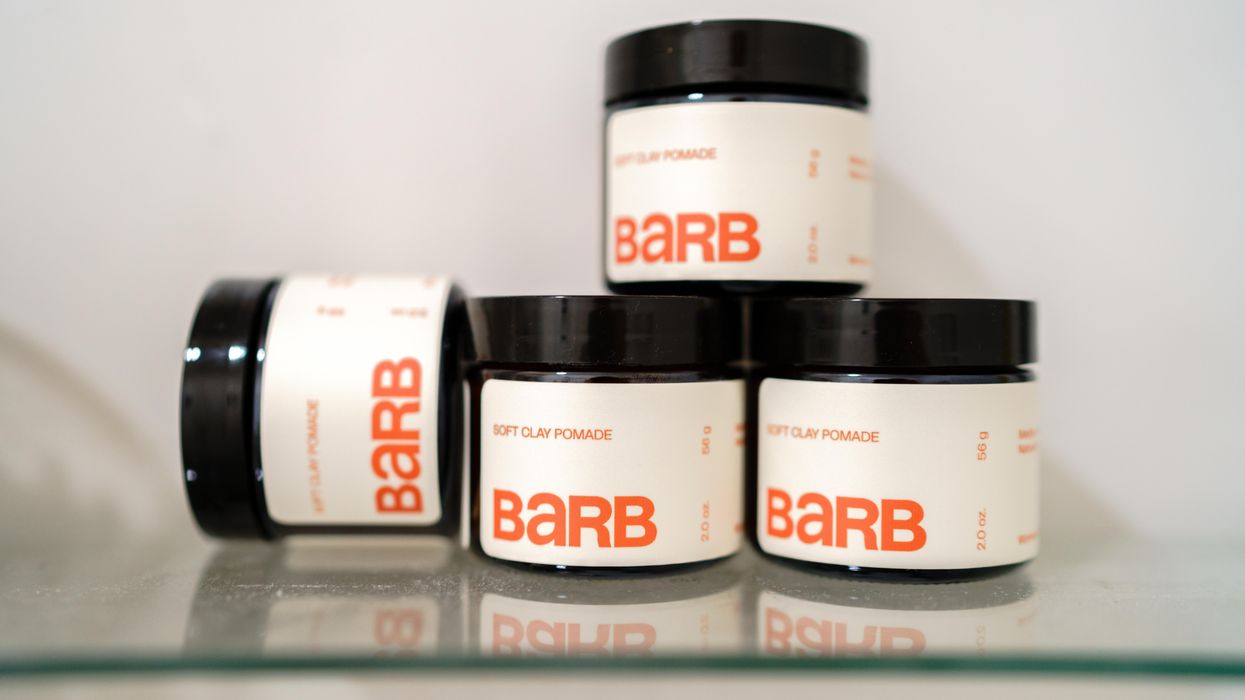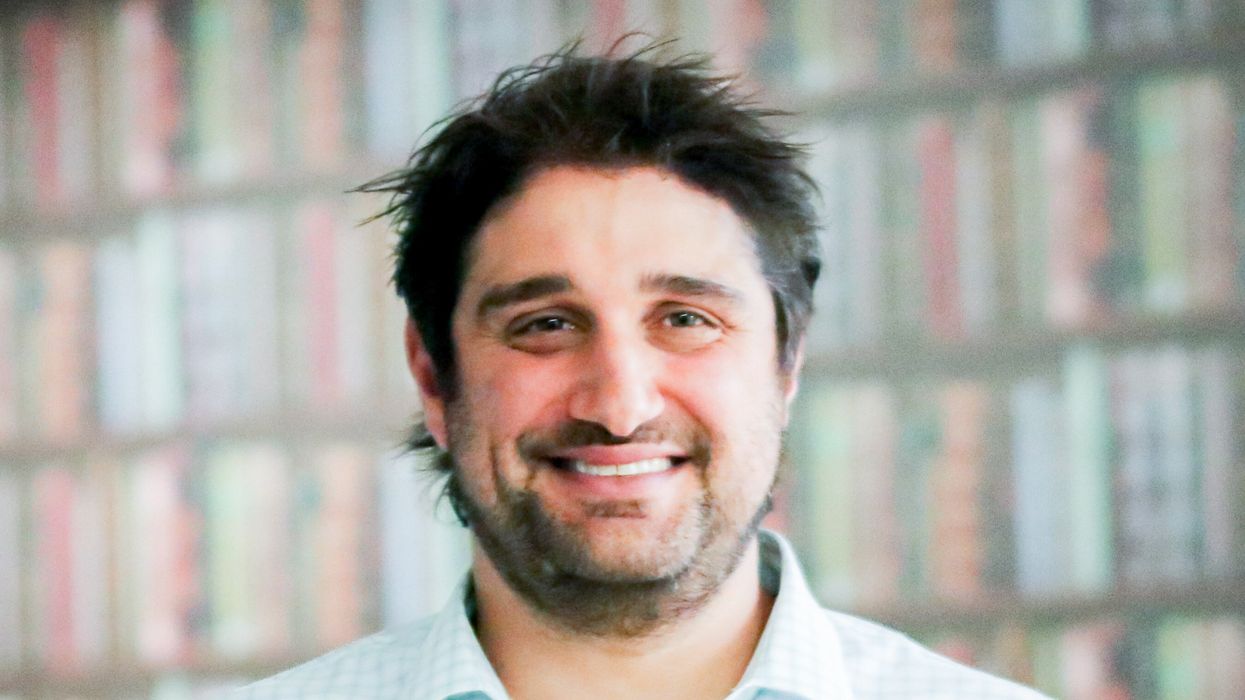Brand News
18 May 2022
How Barb is building an inclusive brand for people with short hair
Cofounders Sheena Lister and Megan Andrews talk about growing a community of Barbs.

Barb's soft clay pomade
Cofounders Sheena Lister and Megan Andrews talk about growing a community of Barbs.

Barb's soft clay pomade
Successful businesses often solve problems. Creating new products is part of the equation, but reaching a group of people that don't see themselves reflected in the marketplace can be just as important.
That reminder shined through during a recent conversation with Sheena Lister and Megan Andrews, the cofounders of gender inclusive haircare brand Barb.
After years of buying short hair products that were geared toward men, they created a brand for all people who have hair above the chin line.
“We’re creating products and community that are designed for people who express themselves through their short hair,” Lister said.
That group has been typically underrepresented in this facet of the beauty industry.
Now, they're Barbs.
Here’s a look at how the San Francisco-based startup's journey so far:
Lister and Andrews have each had short hair for more than 15 years.
“Throughout our short hair journey we’ve been buying products that are marketed and made for men,” Lister said. “...We thought, imagined and hypothesized that there are lots of people like us that would appreciate a different type of product.”
In working to solve for their own needs, they also set out to provide products for a group that is underserved in the market, while also providing opportunity for that group to see themselves reflected in the media that is a big part of the beauty industry.
The brand is focusing on women, nonbinary and trans people. As they build, the cofounders are aiming to create a lifestyle brand for all people with short haircuts.
Launched in June 2021, the brand has a single SKU: A soft clay pomade. It’s a medium hold, natural finish pomade that is designed to be soft on the hands, rather than sticky. The cruelty-free product is made to work on its own, or with other products.

Barb cofounders Sheena Lister and Megan Andrews. (Courtesy photo)
In developing products and bringing them to market, the cofounders are considering and involving their community.
This is evident in elements of the pomade, such as its gender-neutral fragrance. Equally, marketing materials and Instagram photos show women and non-binary proudly rocking short hair.
“All of these things are designed so people can identify with our brand without feeling like they’re fitting into a binary or box,” Andrews said.
It’s the identity of the business, and led the cofounders to deem this community Barbs. As Lister explained it, Barb could be a noun, or an action. It’s also a mindset reflected in people moving through the world and living their “true, authentic selves,” Lister said.
And the Barbs aren't only represented in the consumer base. The people who style their hair are BarbTenders, while those who carry the products are BarbTailers. After all, they have an important place in the industry, and the cofounders say they have been overlooked, as well.
Lister and Andrews want Barbs to be involved at every step of the way, providing input and pointing out new opportunities. That ideal is set to be put into practice with a new program the brand is launching in June. Called BaRb & D, it will bring together 16 stylists and barbers to help develop three new products. The partners will be compensated, and credited across the products and marketing materials for their role in developing them.
When it comes to selling the product, Barb is taking a multifaceted approach. A big portion of the business is direct-to-consumer through their website (thebarbshop.com), and they’ve primarily found marketing success through Instagram.
Through wholesale, Barb has also entered more than 40 barbershops and salons. A partnership with Urban Outfitters is extending a presence through the retailer's digital channels.
It has led to a 26% month-over-month growth rate. And the seeds of loyalty are being planted. Since launching with an initial cohort wholesale partners, they’ve seen a 100% repurchase rate.
They're getting mentorship and support along the way. Lister and Andrews are part of the latest cohort of XRC Labs, an accelerator focused on retail tech and consumer goods. They’ll be pitching on Thursday, May 19, at the program’s demo day at New York’s Webster Hall.
Going forward, the cofounders are working to develop more products, with the aim of rolling out those identified in the BaRb & D program in the first quarter of 2023. With more SKUs, they see potential to enter larger big-box retailers, where many digitally-native beauty startups are now finding success.
They want to create a space for all, and that means there's plenty of room to bring others in who weren't necessarily considered in the original plan. Initially, they set out to reach 25-49 year-olds. But a recent consumer survey showed interest from a wider range, as respondents were aged 18 to 73.
It reflected the potential to reach people in those groups who are underserved in beauty. For instance, women in their 50s and 60s opt for short hair, but typically don’t have products designed for them.
Lister and Andrews are ready to welcome them as the Stately Barbs.
“The community has already been there,” Andrews said of people with short hair. “We’ve been around for a long time, but we’re giving people a name and a home.”
On the Move has the latest from Amazon, Lovesac and more.
Ryan Cohen is executive chairman of GameStop. (Photo by Flickr user Bill Jerome, used under a Creative Commons) license.
This week, leadership is changing at GameStop, Sorel and Beautycounter. Meanwhile, key executives are departing at Amazon, Wayfair and Lovesac.
Here’s a look at the latest shuffles:
GameStop announced the termination of Matthew Furlong as CEO on Wednesday. A brief statement did not provide a reason for the firing.
With the move, Chewy founder and activist investor Ryan Cohen was named executive chairman of the video game retailer. Cohen will be responsible for capital allocation and overseeing management.
It came as the company reported a 10% year-over-year decline in net sales for the first quarter. Meanwhile, the company’s net loss improved by 62%.
In an SEC filing, GameStop further added this “We believe the combination of these efforts to stabilize and optimize our core business and achieve sustained profitability while also focusing on capital allocation under Mr. Cohen’s leadership will further unlock long-term value creation for our stockholders.”
Cohen was revealed as GameStop's largest shareholder when he disclosed a 10% stake in the retailer in 2020. GameStop went on to become a leading name in the meme stock rise of 2021.
Mark Nenow is stepping down as president of the Sorel brand in order to focus on his health.
After rising to the role in 2015, Nenow spearheaded a transformation of Columbia Sportswear-owned Sorel from a men’s workwear brand to a fashion-focused brand that led with a women’s offering of boots, sandals and sneakers.
“Mark led the brand to sales of $347 million in net sales in 2022,” said Columbia Sportswear CEO Tim Boyle, in a statement. “His leadership has been invaluable to this company, and we wish him the very best.”
Columbia will conduct a search for Nenow’s replacement. Craig Zanon, the company’s SVP of emerging brands, will lead Sorel in the interim.
Beautycounter appointed board member Mindy Mackenzie as interim CEO, succeeding Marc Rey. According to the brand, Rey and the board “mutually decided to transition to a new phase of leadership for Beautycounter.”
McKenzie, a former executive at Carlyle, McKinsey and Jim Beam, will lead the company as it conducts a search for a permanent CEO. Additionally, former Natura & Co CEO Roberto Marques will join Beautycounter’s board as chair.
As part of the transition, Nicole Malozi is also joining the company as chief financial officer. She brings experience from Tatcha, Nike, and DFS Group Limited.
Melissa Nick, a VP of customer fulfillment for North America at Amazon, will leave the company, effective June 16, CNBC reported. Nick joined the company in 2014, and oversaw a region that included nearly 300 fulfillment centers. After doubling its supply chain footprint during the pandemic, Amazon recently reorganized its fulfillment operations to take a regional approach, as opposed to a national model that often resulted in items shipping across the country.

Jon Blotner (Courtesy photo)
Steve Oblak will retire from the role of chief commercial officer at home goods marketplace Wayfair. With the move, Jon Blotner will be promoted to chief commercial officer.
"Steve has served as a critical part of our leadership team and played a pivotal role in Wayfair's growth, helping us grow from a $250 million business when he joined to $12 billion in net revenue today,” said Wayfair CEO Niraj Shah, in a statement. “He oversaw countless milestones, from helping to launch the Wayfair brand as we brought together hundreds of sites into a single platform, to launching new categories, business lines, and geographies while overseeing our North American and European businesses, to leading our debut into physical retail.”
Blotner previously oversaw exclusive and specialty retail brands, as well as digital media at Wayfair. Before joining the company, he served as president of Gemvara.com prior to its 2016 acquisition by Berkshire Hathaway.
Furniture retailer Lovesac said Donna Dellomo will retire as EVP and CFO, and move to an advisory role, effective June 30. Dellomo was with Lovesac for six years.
Keith Siegner was appointed as the next EVP and CFO. He brings experience as CFO of esports company Vindex, as well as executive roles at Yum! Brands, UBS Securities and Credit Suisse.
Additionally, Jack Krause will retire from the role of chief strategy officer, effective June 30. His responsibilities will be divided between CEO Shawn Nelson and president Mary Fox.
“Since joining Lovesac, Jack has played an instrumental role in transforming the Company into a true omni channel retailer by helping expand our physical touchpoints and digital platform as we continue to disrupt the industry,” said Nelson, in a statement.
The National Retail Federation announced the addition of five new board members. They include: